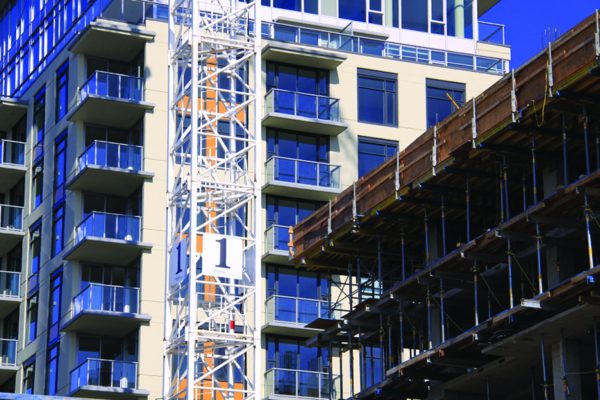Members of the B.C. chapter of the International Building Performance Simulation Association (IBPSA) recently were treated to a presentation by the Pacific Climate Impacts Consortium (PCIC) that incorporates projections of future climate conditions into computer-based building performance simulations.
“Designers of large buildings commonly use computer models to support the design of energy-efficient buildings and ensure the appropriate design of heating and cooling systems,” said Ralph Wells, one of the presenters. “However, these models use weather files that represent current climate conditions,” said Wells, community energy manager at the University of BC’s campus and community planning. “As a result, building designs don’t typically consider future climate conditions, which are expected to be significantly warmer.”
By using climate projections to create future climate files, energy modellers will have the tools they need to design for current and future conditions, says Wells.
“That’s important because buildings last for many decades,” he said.
Wells says the project also includes a study to explore design options for multi-family residential buildings that are resilient to future climate conditions.
Co-presenter Trevor Murdock, a climate scientist with PCIC, says the focus of the talk — entitled Future Weather Files to Support Design of Climate Resilient Buildings — was heating and cooling demand.
“It’s important to incorporate future climate information into building design today in order to optimize energy efficiency for the actual climate that buildings will experience,” said Murdock. “We want to avoid setting buildings up for retrofits for things that could have been anticipated. And it’s important to make sure local IBPSA members are up to speed on the latest developments in considering future climate information in building design.”

Founded in 2013, IBPSA BC is a chapter of IBPSA Canada.
IBPSA Canada, for its part, is a regional affiliate of IBPSA (also known as IBPSA World), a non-profit international society of building performance simulation researchers, developers and practitioners whose goal is to improve the built environment.
IBPSA BC consists of a general membership (mostly energy modellers), external partners (typically organizations that represent other industry groups), and a five-position executive committee elected for a minimum one-year term by the members.
Susan MacDougall, who is chairwoman of the BC chapter, says its main focus is energy modelling education.
IPBSA BC offers two kinds of education programs.
One is intended to raise the level of experience and education of association members, and to make the skills of modellers more consistent across BC.
The other is aimed at the general BC population, to improve their understanding and appreciation of energy modelling.
In addition to education, IBPSA BC provides a forum for energy modellers to share knowledge, solve problems and discuss emerging technologies.
Energy modelling, or energy system modeling, is the process of building computer models of energy systems in order to analyze them.
The models often employ scenario analysis to investigate different assumptions about the technical and economic conditions at play.
Model outputs can include system feasibility, greenhouse gas emissions, cumulative financial costs, natural resource use, and energy efficiency of the system under investigation.
“Modeling a building’s energy use can take anywhere from a few days to several weeks, depending on the building’s size and complexity,” said MacDougall, who is an engineer and building performance advisor at Focal Engineering Inc. in Victoria. “Project teams want the energy modelling completed as quickly as possible, because it has the potential to slow down a project.”
Energy modelling expertise is not spread evenly throughout British Columbia, with most of it concentrated on the province’s larger buildings.
In 2017, Modus Planning, Design and Engagement Inc.. and Brantwood Consulting prepared the Energy Step Code Training and Capacity Project.
The purpose of the Modus/Brantwood study was to find out if B.C. energy modelling service providers were ready for the Step Code.
The Step Code is non-mandatory provincial legislation that was passed in early 2017 to unify and streamline the way B.C. local governments regulate energy efficiency in buildings.
“Some local governments had adopted their own mandates for energy efficiency,” said Brantwood’s Helen Goodland. “Now, local governments can opt in or they can continue to use the provincial building code, which is not as strict as the Step Code.”
As of the third week in September, 31 B.C. local governments have adopted the Step Code.
The Modus/Brantwood report found that there is sufficient energy modelling expertise in BC for large buildings, but not enough for small, single-family residences.











Recent Comments